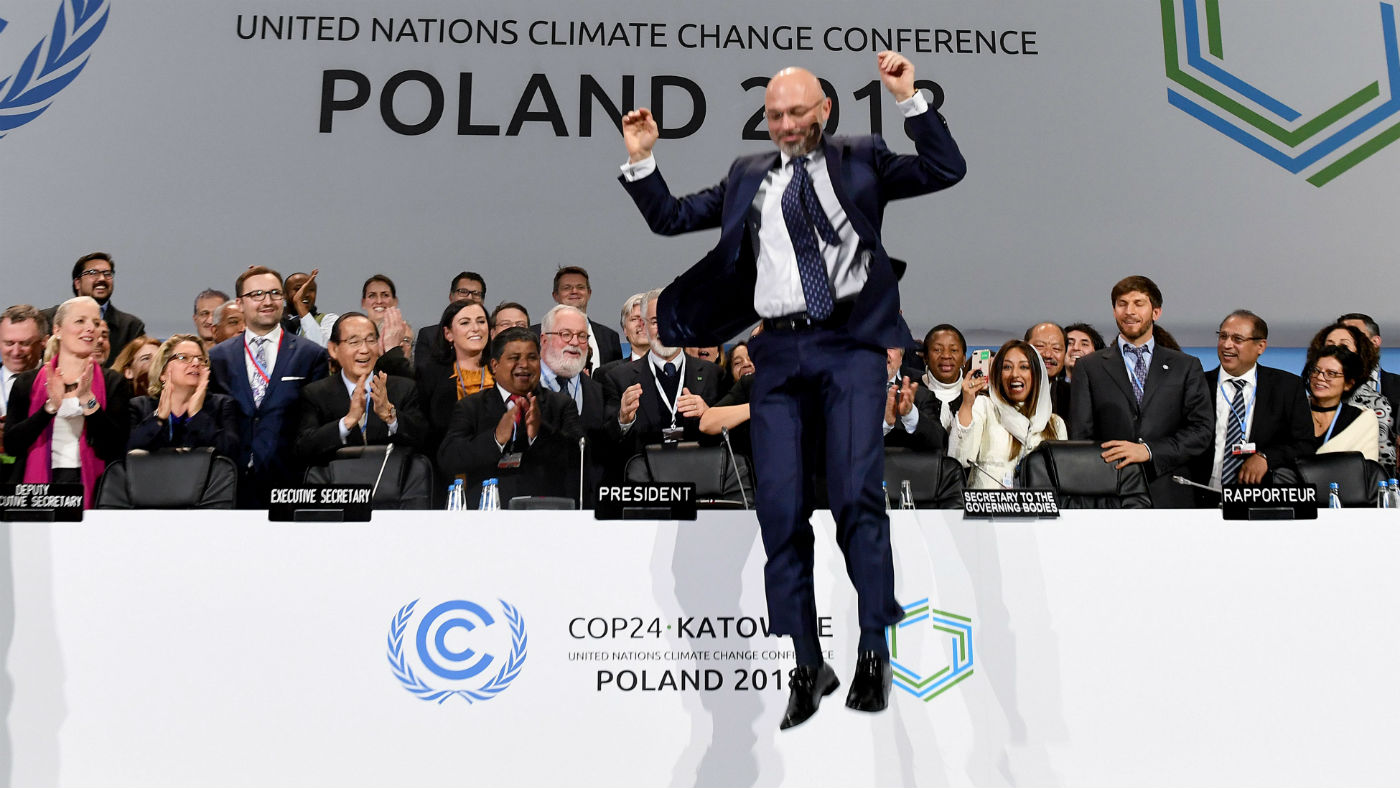Paris climate change ‘rulebook’ agreed
COP24 summit seals accord, but major issues remain unresolved

A free daily email with the biggest news stories of the day – and the best features from TheWeek.com
You are now subscribed
Your newsletter sign-up was successful
International negotiators have finally sealed a deal that will put the 2015 Paris climate change agreement into practice, a moment that sparked jubilant scenes at the UN summit in Poland but has drawn a muted response from environmental campaigners.
The COP24 accord, thrashed out by 196 states over two weeks in Katowice, aims to deliver the Paris goals of limiting global temperature rises to well below 2C.
It outlines plans for a common “rulebook” for all countries, effectively setting regulations that will govern the nuts and bolts of how countries cut carbon, provide finance to poorer nations and ensure that everyone is doing what they say they are doing.
The Week
Escape your echo chamber. Get the facts behind the news, plus analysis from multiple perspectives.

Sign up for The Week's Free Newsletters
From our morning news briefing to a weekly Good News Newsletter, get the best of The Week delivered directly to your inbox.
From our morning news briefing to a weekly Good News Newsletter, get the best of The Week delivered directly to your inbox.
“Sorting out the rulebook sounds easy but is very technical” says the BBC. “Countries often have different definitions and timetables for their carbon cutting actions.”
Poorer countries in particular, many of which are set to be most affected by rising sea levels brought about from global warming, have asked for some flexibility so they are not overwhelmed by regulations they do not have the capacity to implement.
The Guardian says that while the summit “finally ended in clarity, at least on some of the key building blocks for putting the Paris agreement into action”, a number of contentious issues were put off for the future.
Difficult questions such as how to scale up existing commitments on cutting emissions and how to provide finance for poor countries to do the same, remain unresolved.
A free daily email with the biggest news stories of the day – and the best features from TheWeek.com
Ministers also failed to embrace the latest findings from the Intergovernmental Panel on Climate Change (IPCC), which predicted dire consequences if temperatures were allowed to rise more than 1.5C above pre-industrial levels. There was consternation when a motion to “welcome” the report was blocked by US, Russia, Saudi Arabia and Kuwait.
Even as a deal appeared within reach, a last-minute row over carbon credit markets, awarded to countries for their emissions-cutting efforts, threatened to derail the summit and delayed its conclusion by a day.
Growing opposition from key climate change players including the US, Russia and most notably Brazil, whose incoming president Jair Bolsonaro has threatened to pull out of the Paris agreement entirely, mean future talks are “only likely to grow more fractious”, says the Guardian.
Nevertheless, agreement between nearly 200 nations, which had appeared in the balance last week, was warmly welcomed by senior officials, even though environmental and scientist groups delivered a far-more downbeat assessment.
UN climate chief Patricia Espinosa called the final deal an “excellent achievement”, while David Waskow, of the World Resources Institute, said it was “a good foundation” that “sets the direction of travel and will spur countries to take action”.
COP24 Chairman Michal Kurtyka was perhaps the most high-spirited, jumping off the delegate table after the deal had been agreed.
While activists cautiously welcomed elements of the plan, saying “important progress” had been made on ensuring that efforts to tackle climate change by individual nations can be measured and compared, environmental groups were “highly critical of the agreement, warning it lacked ambition and clarity on key issues, including financing for climate projects for developing countries”, say The Independent.
Jennifer Morgan, executive director at Greenpeace International, said: “A year of climate disasters and a dire warning from the world’s top scientists should have led to so much more. Instead, governments let people down again as they ignored the science and the plight of the vulnerable.”
“Recognising the urgency of raised ambition and adopting a set of rules for climate action is not nearly enough when whole nations face extinction,” she added.
Scientists have also been quick to warn the so-called “Paris Rulebook” will not be enough on its own to stop carbon pollution from reaching critical levels, CNN reports.
The news network says “countries would have to do far more to curb fossil fuel use and deforestation to avoid the droughts, superstorms, deadly heat waves and coastal floods associated with global warming”.